 W
WAn Bangjun was one of the Neo-Confucian scholars, politicians and writers of the Korean Joseon Dynasty and he was a people's Militia leader during the Japanese invasions of Korea.
 W
WAn Hyang (1243–1306) also known as An Yu was a leading Confucian scholar born in Yeongju in present-day South Korea. He was from the Clan Ahn of Sunheung. He is considered the founder of Neo-Confucianism in Korea, introducing Song Confucianism to the Goryeo kingdom. An Hyang visited China, transcribing the Chu Tzu Shu and bringing his copy and portraits of Confucius and Zhu Xi to Korea to use in his revitalization of Confucianism. He strove to replace Buddhism with Confucianism.
 W
WBak Gyusu was a scholar-bureaucrat, teacher, politician, and a diplomat of the Joseon Dynasty. He was known as a pioneer of the enlightenment group. Bak Gyusu was the grandson of Park Ji-won, the great Silhak scholar of the Joseon. He was also known by the names of Hwanjae, Hwanjae en Heonjae, and Hwanjaegeosa.
 W
WBak Jega was a scholar of school of Practical learning (Silhak) in the late Joseon Dynasty. He was a student of Park Ji-won.
 W
WBak Jeongyang(korean:박정양, hanja:朴定陽, 1841–1904) was a Korean Joseon dynasty politician and edification activist. a member of independence club(독립협회;獨立協會) and People's joint association(만민공동회;萬民共同會). also a member for Party of Kaehwa, his family was Pannam Park clan. He is also the father of famous Korean play writer Park Seung-hee (1901-1964). Bak Jeongyang was dispatched by Korean King to be the ambassador to the United States in 1887. He went to United States and caused an international outcry from the Chinese Empire which viewed Korea as a vassal state. After many years' conflict, Park was punished and was pushed aside. This episode reveals Korea's desire for complete independence, but demonstrates China's plan to stick to the traditional tributary tie. Park became a victim of this conflict. Park was also the author of a few books.
 W
WBak Jiwon, styled Yeonam, was a philosopher and novelist in the late Joseon dynasty. He has been regarded as one of the greatest thinkers of the so-called "Practical Learning (silhak)" movement. Bak Jiwon belonged to the "School of Profitable Usage and Benefiting the People" to promote the industrialization of his country and the development of trade by positively introducing western technologies to Joseon Korea. Bak Jiwon proposed that Joseon import advanced technologies from the Qing dynasty, and promote mercantilism.
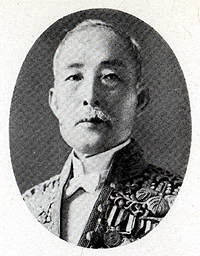 W
WBak Jungyang was a Korean Joseon and Japanese-ruled Korean bureaucrat, politician, liberal and social activist. He demolished the castle of Daegueup and the Old Gyungsangdo Provincial Office, and contributed to city planning and road maintenance in Daegu. also participated in the destruction the Castle of Jinju. He was a conscientious Japanese colonial supporter with pro-Japanese group ideology as well as an advocate for civil rights.
 W
WChoe Chiwon was a noted Korean Confucian official, philosopher, and poet of the late Unified Silla period (668-935). He studied for many years in Tang China, passed the Tang imperial examination, and rose to high office there before returning to Silla, where he made ultimately futile attempts to reform the governmental apparatus of a declining Silla state.
 W
WChoi Ik-hyeon was a Korean Joseon Dynasty scholar, politician, philosopher, and general of the Korean Righteous Army guerrilla forces. He was a strong supporter of Neo-Confucianism and a very vocal nationalist, who defended Korean sovereignty in the face of Japanese imperialism.
 W
WChunseong, born Lee Chang-nim, was a Korean Buddhist monk, scholar, poet, writer, and philosopher. His courtesy name was Muaedoin or Chunseong.
 W
WGil Jae or Kil Jae (1353–1419) was a Neo-Confucian scholar, politician, and writer of Korea's Goryeo Dynasty and early Joseon Dynasty.
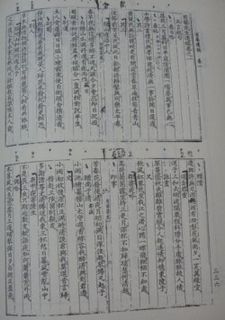 W
WGim Hyowon(김효원, 金孝元, 1542 – 1 April 1590) was a Korean Joseon Dynasty politician, writer, and Neo-Confucian scholar. His pen name was Seongam, and his courtesy name was Inbaek. He was also a leader of the Easterners faction.
 W
WGim Jangsaeng was a Neo-Confucian scholar, politician, educator, and writer of Korea's Joseon period.
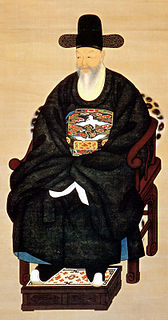 W
WGim Jeong-hui, also known as Kim Jeong-hui, was one of the most celebrated practitioners of calligraphy, epigraphists, and scholars of Korea’s later Joseon period. He was a member of the Gyeongju Gim clan. He used various Ho (pen-names): Wandang (阮堂), Chusa (秋史), Yedang (禮堂), Siam (詩庵), Gwapa (果坡), Nogwa (老果) etc.. He is especially celebrated for having transformed Korean epigraphy and for having created the “Chusa-che” inspired by his study of ancient Korean and Chinese epitaphs. His ink paintings, especially of orchids, are equally admired.
 W
WGim Jip (1574–1656) was a Korean Joseon Neo-Confucian scholar, politician, educator and writer. He was also the teacher of Song Si-yeol and Song Jun-gil, great Korean Neo-Confucian scholars.
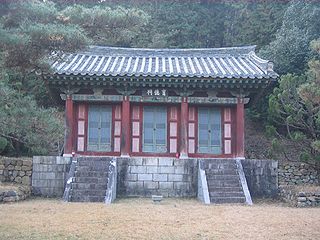 W
WGim Jongjik, often known by his pen name Jeompiljae(점필재), was a leading Korean Neo-Confucian scholar in the early Joseon Dynasty. He was born in Miryang in Gyeongsang province, to a yangban family of the Seonsan Gim lineage. He passed the jinsa literary licentiate examination in 1453 and the higher examination in 1459.
Gim Seokju was one of the Neo-Confucian scholars, politicians and writers of the Korean Joseon Dynasty. His nickname was Sigam, a courtesy name was Sabaek. He was a cousin of Queen Myunseong. He was prime minister of the Joseon Dynasty in 1680.
 W
WGim Yuk or Kim Yuk was a Korean Neo-Confucian scholar, politician and writer of the Korean Joseon Dynasty. His nickname was Jamgok, Hoejeongdang, a courtesy name was Baekhu, and his posthumous name was Munjeong. He came from the Cheongpung Kim clan.
 W
WGwon Sangha(1641 - September 2, 1712) was a politician and Neo-Confucian scholar of Joseon Dynasty. He was a member of Westner party(서인, 西人) and the second head of Noron(노론, 老論) partys. His pennames were Suam and Hansujae.
 W
WHa Ryun, also spelled Ha Yun, was a Joseon Dynasty politician and Neo-Confucian scholar, educator, and writer. He served as Prime Minister or Chief State Councillor during the reign of King Taejong from 1408 to 1409, from 1409 to 1412 and again from 1414–1415.
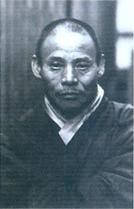 W
WHan Yong-un was a twentieth century Korean Buddhist reformer and poet. This name was his religious name, given by his meditation instructor in 1905, and Manhae (만해) was his pen name; his birth name was Han Yu-cheon.
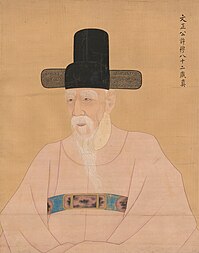 W
WHeo Mok was a Korean politician, scholar, and calligrapher during the Joseon Dynasty. Heo was most commonly known by the pen name Misu.
 W
WHo Jong-suk was a Korean independence activist, writer, journalist, and communist. Her real name was Jongja.
 W
WHong Daeyong, styled Damheon was a philosopher, astronomer and mathematician of the late Joseon Kingdom. Hong was an early leader of the Profitable Usage and Benefiting the People school of thought. It worked to promote the industrialization of his country and the development of trade by positively introducing Western technologies to Joseon Korea. Hong was a friend of Park Ji-won, who was another leader of the Profitable Usage school.
 W
WHyujeong, also called Seosan Daesa was a Korean Seon master. As was common for monks in this time, he travelled from place to place, living in a succession of monasteries. Buddhist monks had been forced to keep a low profile since General Yi Seonggye had been forced to eject Buddhism from its state of total permeation of government in order to gain the support of Neo-Confucian scholar-officials to consolidate his position against his Buddhist political opponents when he overthrew Gongyang of Goryeo in 1392 to become King Taejo of Joseon.
 W
WJang Hyeongwang was a Korean politician and educator, as well as a Neo-Confucian scholar of the Joseon dynasty. He was the disciple of Jeong Gu and the teacher of Heo Mok and Yun Hyu. His pen name was Yeoheon (여헌).
 W
WJeong Dojeon, also known by his pen name Sambong, was a prominent Korean scholar-official during the late Goryeo to the early Joseon periods. He served as the first Chief State Councillor of Joseon, from 1392 until 1398 when he was killed by Yi Bang-won, the fifth son of Yi Seong-gye, the founder of the Joseon dynasty. Jeong Dojeon was an adviser to Yi Seong-gye and also the principal architect of the Joseon dynasty's policies, laying down the kingdom's ideological, institutional, and legal frameworks which would govern it for five centuries.
 W
WJeong Mong-ju(Korean: 정몽주, Hanja: 鄭夢周, January 13, 1338 – April 26, 1392), also known by his pen name Poeun, was a prominent Korean scholar-official and diplomat during the late Goryeo period.
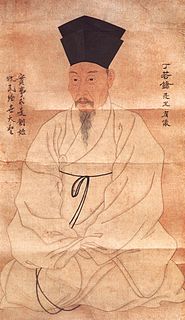 W
WJeong Yakyong / Jung Yak-Yong, often simply known as ‘Dasan’, was born on the 16th day of the 6th lunar month, 1762, in Gwangju county, Gyeonggi province, and died there on the 22nd day of the 2nd lunar month, 1836. He was one of the greatest thinkers of the later Joseon period, wrote highly influential books about philosophy, science and theories of government, held significant administrative positions, was a close confidant of King Jeongjo, and was noted as a poet. His philosophical position is often identified with the Silhak school, and his concerns are better seen as explorations of Neo-Confucian themes. He spent 18 years in exile in Gangjin, South Jeolla province, from 1801 until 1818, on account of his membership of the Southerners (Nam-in) faction, and also because of the Catholic faith of his elder brother. His clan originated in Naju, South Jeolla Province. At birth he was given the courtesy title Gwi’nong (歸農), and later he was also known by the ja Miyong (美鏞) and Songbu (頌甫)美庸); among his ho were Saam (俟菴), Tagong (籜翁), Taesu (苔叟), Jahadoin (紫霞道人), Cheolmasanin (鐵馬山人), Dasan (茶山), Yeoyudang, and Mundo. Korean Catholics sometimes claim that he was baptized with the name John Baptist, but there is no documentary proof of this.
 W
WJinul Puril Bojo Daesa, often called Jinul or Chinul for short, was a Korean monk of the Goryeo period, who is considered to be the most influential figure in the formation of Korean Seon (Zen) Buddhism. He is credited as the founder of the Jogye Order, by working to unify the disparate sects in Korean Buddhism into a cohesive organization.
 W
WJo Gwangjo, also often called by his pen name Jeong-am, was Korean Neo-Confucian scholar who pursued radical reforms during the reign of Jungjong of Joseon in the early 16th century.
 W
WKim Si-seup (1435–1493) was a Korean scholar and author.
 W
WMangong or Song Mangong was a Korean Buddhist monk, independence activist, scholar, poet, writer and philosopher, in the period of the Japanese Occupation of Korea. ManGong was born in Jeong Eup, Jeonbuk Province in 1871 and was ordained at the age of 14. Except for three years’ Zen teaching in Mahayeon Temple in Keumkang Mountain and serving shortly as Abbot of Magok Temple, he spent most of his life teaching Zen at Deoksung Mountain in Yesan, Chungnam Province. Mangong revitalized the Zen tradition of Korean Buddhism along with his teacher, Zen Master Kyongho.
 W
WSin Chaeho, or Shin Chae-ho (1880–1936), was a Korean independence activist, historian, anarchist, nationalist, and a founder of Korean ethnic nationalist historiography. He is held in high esteem in both North and South Korea. Two of his works, A New Reading of History, written in 1908, and The Early History of Joseon, published in 1931, are considered key works of nationalist historiography in modern Korea. He argued that modern Koreans and the people of Manchuria were of a single race which has an ancestral claim to both Korea and Manchuria, Shin also studied Korean mythology. During his exile in China, Shin joined the Eastern Anarchist Association and wrote anti-imperialist and pro-independence articles in various outlets; his anarchist activities lead to his arrest and subsequent death in prison, February 21, 1936.
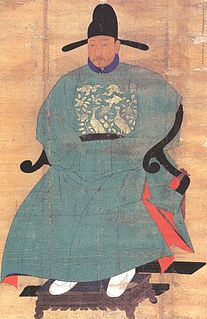 W
WSin Suk-ju was a Korean politician during the Joseon Dynasty. He served as Prime Minister from 1461 to 1466 and again from 1471 to 1475.
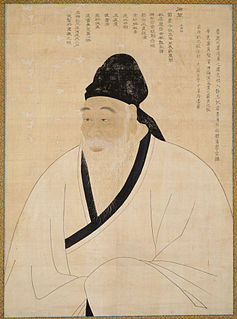 W
WSong Siyeol, also known by his pennames Uam (우암) and Ujae (우재) or by the honorific Songja, was a Joseon statesman and a Neo-Confucian scholar and philosopher. Born in Okcheon, North Chungcheong, he was known for his concern with the problems of the common people. He served in governmental service for more than fifty years, and his name features over 3,000 times in the Annals of Joseon Dynasty, the greatest frequency that any individual is mentioned. He was executed by the royal court for writing an inflammatory letter to the king. There is a monument to him in his hometown. He is also known as the calligrapher who inscribed an epitaph in dedication of Admiral Yi Sunsin, which is preserved at the Chungryeolsa Shrine.
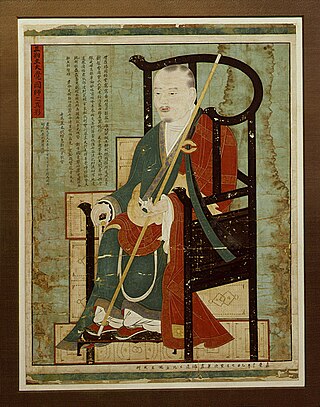 W
WUicheon was a Korean Buddhist monk who founded the Cheontae school of Buddhism. He was the son of King Munjong of Goryeo. He lived at Ryongtongsa in Kaesong for much of his life and was buried there, where his tomb can be found today.
 W
WUisang (625–702) was one of the most eminent early Silla Korean scholar-monks, a close friend of Wonhyo (元曉).
 W
WWoncheuk (613–696) was a Korean Buddhist monk who did most of his writing in China, though his legacy was transmitted by a disciple to Silla. One of the two star pupils of Xuanzang, his works and devotion to the translation projects was revered throughout China and Korea, even reaching Chinese rulers like Emperors Taizong and Gaozong of Tang and Empress Wu of Zhou. His exegetical work was also revered and greatly influenced Tibetan Buddhism and the greater Himalayan region.
 W
WWon Hyo was one of the leading thinkers, writers and commentators of the Korean Buddhist tradition. Essence-Function, a key concept in East Asian Buddhism and particularly Korean Buddhism, was refined in the syncretic philosophy and world view of Wonhyo.
 W
WYi Hwang (1501–1570) was a Korean philosopher and writer. He was one of the two most prominent Korean Confucian scholars of the Joseon Dynasty, the other being his younger contemporary Yi I (Yulgok). A key figure of the Neo-Confucian literati, he established the Yeongnam School and set up the Dosan Seowon, a private Confucian academy. Yi Hwang is often referred to by his pen name Toegye. His courtesy name was Gyeongho.
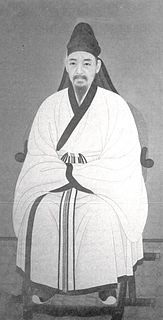 W
WYi I was a Korean philosopher and writer. He was one of the two most prominent Korean Confucian scholars of the Joseon Dynasty, the other being his older contemporary, Yi Hwang (Toegye). Yi I is often referred to by his pen name Yulgok. He is not only known as a scholar but also as a revered politician and reformer. He was academical successor of Jo Gwang-jo.
 W
W"Seongho" Yi Ik (1681–1763) was a Korean Neo-Confucian scholar, early Silhak philosopher and social critic. He was born to a yangban family of the Yeoju Yi clan. His one disciple of Yi Seo-woo, was Misu Heo Mok and Baikho Yun Hyu's school disciples. second cousin of Yu Hyeong-won. Like most in his position, he studied for the gwageo in order to gain a position of rank; but failed in his first attempt in 1705. Shortly thereafter, his elder brother Yi Jam was beaten to death as part of the Lady Jang incident, and Yi lost interest in government service.
 W
WYi Jehyeon was a politician and early Korean Neo-Confucianism scholar and philosopher, writer, and poet. His first name was Jigong. A pen name was Ikjae ·Yeogong ·Shiljae, courtesy name was Jungsa. He was a follower and successor of Baek Yijeong, and was the father of Hyebi Yi, who was a concubine of Gongmin of Goryeo.
 W
WYi Saek, also known by his pen name Mogeun, was a Korean writer and poet. His family belonged to the Hansan Yi clan. Yi Saek played a crucial role in the introduction and localisation of philosophy of Zhu Xi. He studied Neo-Confucianism in Yuan Dynasty China and opened an academy after his return to Goryeo, and from his academy the founders of Joseon Dynasty were educated.
 W
WYi Sanhae ·Jukpiong(죽피옹, 竹皮翁)·Sichongeosa(시촌거사, 枾村居士).
 W
WSamyeongdang (1544–1610), also known by his dharma name Yujeong, was a Korean Buddhist monk during the Joseon era. He is sometimes identified by his pen name, Song-un. He was born to a family of the Im clan in Miryang, Gyeongsang Province. After the deaths of his mother in 1558 and his father in 1559, he became a monk at Jikjisa on Hwangaksan in Gimcheon.
 W
WYun Doo-su(윤두수, 尹斗壽, 1533–1601) was Joseon Dynasty Politician, Poet, Writer, and Neo-Confucian philosophic scholar. He served as the Yeonguijeong during the reign of King Seonjo. His pen name was Oheum(오음, 梧陰), courtesy name was Jaang. He was follower of Yi Hwang school among Westerners.
 W
WYun Geunsu(윤근수, 尹根壽, 1537–1619) was Korean Joseon Dynastys politicians and Writer, Neo-Confucian scholars. a penname was Woljeong(월정, 月汀), Woeam(외암, 畏菴), courtesy name was Jago(자고, 子固).
 W
WYun Hyu was a Korean Joseon Dynasty politician and Neo-Confucian scholar, poet. Yun was the political leader of the Southern (Nam-in) faction of the Joseon Dynasty. His courtesy name was Baegho and Haheon, Yahbo.
 W
WYun Jeung or Yun Chung (1629–1714) was a Confucian scholar in Korea during the late period of the Joseon dynasty. He was known as being a progressive thinker and for his opposition to the formalism and ritualism in the predominant philosophy of Chu Hsi. Yun Chung refused government office because he thought the Korean monarchy was corrupt, and spend his life teaching Sirhak ideas. He is known for the quote, "The king could exist without the people, but the people could not exist without the king."